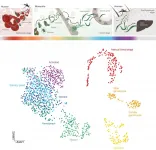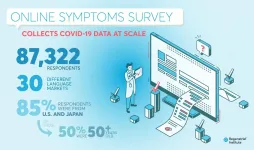(Press-News.org) Poor sleep impacts the risk of long-term cognitive decline in Hispanic/Latino middle aged and older adults differently than it does in non-Hispanic adults, according to research led by University of Miami Miller School of Medicine neurology faculty and the largest long-term study of U.S. Hispanic/Latinos to date.
During seven years of follow-up, Hispanics/Latinos were more likely to develop cognitive declines in processing speed, mental flexibility, and verbal memory, if they had sleep disordered breathing, such as obstructive sleep apnea, and long sleep duration of nine or more hours. The risk was especially high in middle-aged adults without metabolic syndrome and women without obesity or metabolic syndrome according to the paper recently published in Alzheimer's & Dementia, the Journal of the Alzheimer's Association.
"A surprising finding of this study of 5,500 U.S. Hispanic/Latino adults was that participants without obesity that had sleep apnea and long sleep duration had worse cognitive decline," said senior author Alberto Ramos, M.D., M.S.P.H., associate professor of neurology, and research director of the Sleep Disorders Program. "To some extent, this was like a natural experiment where we removed the effect that obesity has on cognition and saw 'the pure effect' of sleep difficulties, such as sleep apnea, and long sleep duration on cognitive health."
The work shows that the metabolic risk factors that predict neurocognitive decline in non-Hispanics are not generalizable to Hispanics, according to Sonya Kaur, Ph.D., instructor in the Division of Neuropsychology at the Miller School.
"In general, the relationship between sleep and cognition was not mediated by metabolic syndrome and obesity in Hispanics like it is in non-Hispanics," Dr. Kaur said. "For Hispanics, sleep seems to be a much stronger predictor than obesity and metabolic syndrome that are traditionally thought as predictors in terms of what causes cognitive decline in non-Hispanics."
This is important given that, compared to non-Hispanic whites, Hispanics/Latinos are at greater risk for metabolic syndrome and are at 4 times the risk of Alzheimer's disease and related dementias, according to Dr. Kaur.
The findings highlight the importance of a precision medicine approach in studying and treating Hispanic/Latino patients.
"In the big picture, these findings have implications for how we can personalize treatment of sleep disorders to more effectively lessen cognitive decline, prevent neurocognitive disorders such as Alzheimer's disease and preserve brain health," Dr. Ramos said.
The Miller School has long been a leader in identifying disorders and risk factors associated with dementia and Alzheimer's and Hispanic health.
"We are conducting ongoing research on the cognitive effects of migration factors and genetic risk factors in Hispanic patients, because there is evidence that genetic risk factors in non-Hispanic whites do not predict cognition decline in the same way as in Hispanics," Dr. Kaur said.
Previously, Dr. Ramos and colleagues published data showing a high prevalence of sleep disorders associated with neurocognitive dysfunction, including memory decline, in a diverse population of Hispanic/Latino participants.
"This study builds on our previous work," said Dr. Ramos, who recently was awarded a five-year $13 million grant from the National Institute on Aging (NIA) to study "Sleep in Neurocognitive Aging and Alzheimer's Research."
INFORMATION:
The study in Alzheimer's & Dementia was done in collaboration with investigators from Wayne State University, University of California San Diego, University of Illinois at Chicago, Mount Sinai Icahn School of Medicine, University of North Carolina at Chapel Hill, San Diego State University, Miami Veterans Association Medical Center, and Brigham and Women's Hospital, Harvard Medical School.
Oysters' exposure to plastics is concerning, particularly because these materials can accumulate and release metals which are then absorbed by the molluscs. According to a recent study published in the journal Chemosphere, the combined presence of nanoplastics and arsenic affects the biological functions of oysters. This study was conducted by the Institut national de la recherche scientifique (INRS) in Québec City and the French National Centre for Scientific Research (CNRS) at the University of Bordeaux in France.
The international research team chose to study arsenic, since it is one of the most common metals absorbed ...
PULLMAN, Wash. - For decades, wealthy nations have transported plastic trash, and the environmental problems that go with it, to poorer countries, but researchers have found a potential bright side to this seemingly unequal trade: plastic waste may provide an economic boon for the lower-income countries.
In a study published in the Journal of World Systems Research, Yikang Bai of Washington State University and Jennifer Givens of Utah State University analyzed 11 years of data on the global plastics trade against economic measures for 85 countries. They found that the import of plastic waste was associated with growth in gross domestic product per capita in the lower-income countries.
"Our study offers a nuanced understanding of the global trade in plastic waste," said Bai, ...
DALLAS, May 27, 2021 -- Adults who have obsessive-compulsive disorder (OCD) were more than three times as likely to have an ischemic stroke later in life compared to adults who do not have OCD, according to new research published today in Stroke, a journal of the American Stroke Association, a division of the American Heart Association.
"The results of our study should encourage people with OCD to maintain a healthy lifestyle, such as quitting or not smoking, getting regular physical activity and managing a healthy weight to avoid stroke-related risk factors," said study senior author Ya-Mei Bai, M.D., Ph.D., a professor in the department of psychiatry at Taipei Veterans General Hospital ...
Researchers have mapped in fine detail the genetic changes malaria parasites go through as they prepare to infect people.
The atlas maps the malaria parasite Plasmodium falciparum in unprecedented cellular detail as it develops inside a mosquito and prepares to infect humans through a bite. This detailed investigation could lead to new ways to block key stages in the parasite's development and prevent transmission through future drugs or vaccines.
Mosquitoes are increasingly resistant to pesticides, and the parasite that causes malaria is also becoming increasingly ...
A cutting-edge digital tool that will make it cheaper, safer and faster for pharmaceutical companies to predict protein stability - a vital step in the development of new medicines - is being rolled out by scientists from the UK's University of Bath through their spin-out company, BLOC Labs.
The tool, launched this week, will help researchers identify the most promising protein molecules for drug development. It has the potential to play an important role in the creation of monoclonal antibodies (mAbs). The market for these therapeutic antibodies is worth over £70 bn.
Monoclonal antibodies are a type of protein derived from natural antibodies and then refined and mass produced in the lab. They are steadily transforming the way we treat and prevent diseases, from ...
Nearly three years after the Trump administration's "Zero Tolerance" policy went into effect, more than 445 children remain separated from their families, largely due to insufficient identifying paperwork and U.S. immigration officials' failures to plan, track and reunite separated families. In a Policy Forum, Elizabeth Barnert and colleagues - an interdisciplinary group of physicians, scientists and human rights advocates - argue that a well-defined, replicable, scalable, and sustainable framework to collect and manage sensitive DNA data is urgently needed in order to play a part in helping reunite separated migrant families safely and ethically. ...
Research across a wide range of languages shows that children's home literacy environment can often predict their language and literacy skills. However few studies, especially for English speaking children, examine how children's development affects what parents do and not just how parents affect their children's development. A new longitudinal study examined such bidirectional relationships between home literacy environment and children's progress in learning to read between grades 1 and 3. Results show that parents adjust their reading activities with their children over time, taking into account the level of difficulty the children are having in learning to ...
Research shows that poor sleep health may disproportionately affect children of color from families of low socioeconomic status and place them at risk for behavior problems and lower academic performance. However, few sleep studies utilize standard measures of both classroom behavior and academic achievement.
A new longitudinal study examined the relation between sleep, classroom behavior, and academic achievement scores among primarily Black children growing up in historically disinvested neighborhoods. Disinvested refers to neighborhoods in which public and private funding, city services, or other necessary resources have been denied or withheld, and which are often segregated ...
INDIANAPOLIS -- A pilot project using an online survey to gather data on COVID-19 symptoms received more than 87,000 responses from around the world, providing important insight into the spread of disease. Project leaders from Regenstrief Institute, Indiana University and Microsoft believe these questionnaires could be a valuable tool for population health.
The 7-question survey was launched in multiple languages during April 2020, as lockdowns were implemented to slow the spread of COVID-19. A link to the survey was placed in banner ads in Microsoft News articles. Respondents ...
If a ban were introduced on the sale of new petrol and diesel cars, and they were replaced by electric cars, the result would be a great reduction in carbon dioxide emissions. That is the finding of new research from Chalmers University of Technology, Sweden, looking at emissions from the entire life cycle - from manufacture of electric cars and batteries, to electricity used for operation. However, the total effect of a phasing out of fossil-fuelled cars will not be felt until the middle of the century - and how the batteries are manufactured will affect ...



